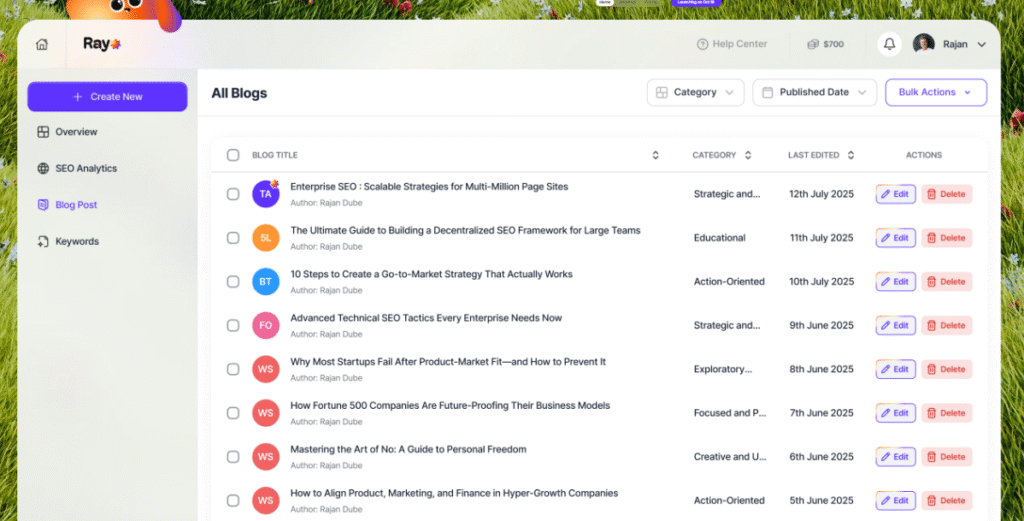Looking for a solid MarketMuse alternative? You’re not alone. While MarketMuse pioneered AI-powered content optimization, its premium pricing has many content creators and SEO teams searching for other options that won’t break the bank but still deliver results.
The content optimization landscape has evolved dramatically, and 2025 brings us powerful competitors that match or even surpass MarketMuse in specific areas. Whether you need better pricing, more intuitive interfaces, or specialized features, there’s likely an alternative that fits your workflow perfectly.
Top MarketMuse Alternatives for 2025
Let’s dive into the best MarketMuse competitors that deserve your attention this year, each bringing something unique to the table.
Frase: Strong NLP with flexible pricing
Frase has become a favorite among content creators who want powerful natural language processing without the enterprise price tag. What makes Frase stand out is its ability to research, outline, and optimize content all in one platform.
The tool excels at generating AI-powered content briefs and offers a robust question research feature that helps you address user intent comprehensively. Frase’s pricing starts significantly lower than MarketMuse, with flexible plans that scale with your needs.
Plus, its interface is intuitive enough for individual content creators while offering enough depth for agencies managing multiple clients.
Rayo: Write Content on Autopilot
Rayo is the new kid on the block that’s making waves with its “content on autopilot” approach. Unlike many competitors, Rayo focuses on simplifying the entire content creation process from start to finish.
What sets it apart is its streamlined workflow that takes you from keyword research to publication-ready drafts without jumping between multiple tools. The platform uses advanced AI to analyze top-ranking content and generate optimized drafts that need minimal human editing.
For teams struggling with content production velocity, Rayo offers a compelling solution that can dramatically reduce the time from concept to publication.

Clearscope: High-end usability with Google focus
When comparing Frase vs Clearscope, the latter shines with its laser focus on what Google wants to see. Clearscope has built its reputation on a clean, no-nonsense interface that clearly shows you exactly what terms to include in your content.
Its content grading system is straightforward, giving you an easy-to-understand letter grade that correlates strongly with ranking potential. While it’s positioned in the premium segment alongside MarketMuse, many users find Clearscope’s learning curve gentler and its recommendations more actionable.
The platform also integrates seamlessly with Google Docs, making it a favorite among teams already working in the Google ecosystem.
Surfer SEO: Content scoring with SERP analyzer
Surfer SEO brings a visual approach to content optimization with its intuitive SERP analyzer and content editor. What really makes Surfer stand out is how it correlates multiple on-page factors with SERP positions.
The tool doesn’t just tell you which keywords to include; it helps you optimize content structure, headings, paragraphs, and even images. Surfer’s Content Planner feature also assists in building comprehensive topic clusters that can dominate entire subject areas.
For visual thinkers who want to see the relationship between different ranking factors, Surfer provides insights that text-heavy tools often miss.
Content Harmony: Workflow choices for teams
Content Harmony excels where many other tools fall short: comprehensive workflow management for content teams. Beyond just optimization suggestions, it offers a complete suite for content brief creation, competitor analysis, and team collaboration.
Its briefs are incredibly detailed, giving writers clear guidance on everything from target keywords to headings, questions to answer, and competitors to beat. This makes it ideal for agencies and in-house teams working with multiple writers who need clear direction.
The platform also provides valuable insights into content gaps that competitors have missed, giving you opportunities to create unique content that stands out.
Dashword: Simple UX for quick wins
If you’ve been frustrated by the complexity of other content optimization tools, Dashword might be your answer. It strips away the bells and whistles to focus on what truly matters: creating optimized content quickly.
Dashword’s interface is refreshingly simple yet provides all the essential data needed to create competitive content. The platform automatically identifies relevant terms from top-ranking pages and gives you clear targets to hit.
For smaller teams or individual content creators who want to optimize content without getting lost in technical details, Dashword offers the perfect balance of power and simplicity.
NeuronWriter: AI-suite built for speed and depth
NeuronWriter combines the best aspects of several competitors into a comprehensive AI content suite. What makes it special is how it balances depth of analysis with speed of execution.
The tool provides NLP-based content recommendations while also offering an integrated writing environment with real-time optimization feedback. Its competitor analysis features are particularly strong, allowing you to analyze multiple top-ranking pages simultaneously.
For content teams that need to move quickly without sacrificing quality, NeuronWriter offers an impressive balance of features at a price point that won’t strain your budget.
Choosing the Right Alternative for Your Workflow
The best MarketMuse alternative for your specific needs depends on your priorities. If budget is your main concern, Frase and Dashword offer excellent value. For teams focused on production speed, Rayo and NeuronWriter shine. If you need enterprise-grade features with better usability, Clearscope might be worth the investment.
Consider starting with a free trial of 2-3 options that align with your priorities. Pay special attention to how well each tool integrates with your existing workflow and how actionable its recommendations are for your specific content types.
Remember that the most sophisticated tool isn’t always the best fit. The right alternative is the one that your team actually enjoys using and that consistently helps you produce better-performing content.

Ridam Khare is an SEO strategist with 7+ years of experience specializing in AI-driven content creation. He helps businesses scale high-quality blogs that rank, engage, and convert.



